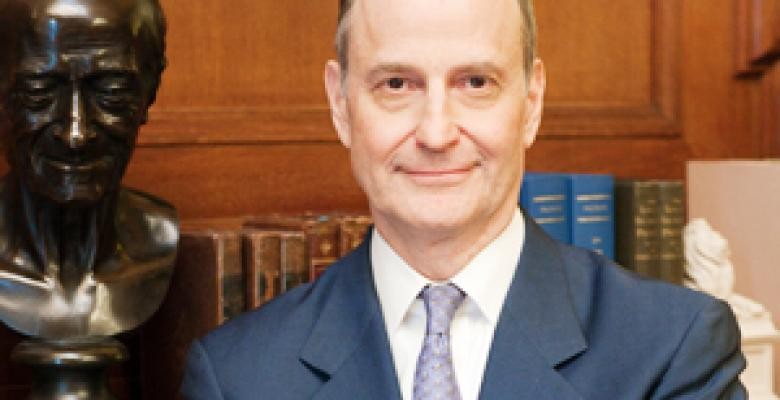Paul LeClerc Named Director of Columbia's Europe Global Center in Paris

Columbia University President Lee C. Bollinger has named Paul LeClerc, former president of the New York Public Library and a noted scholar of French literature, to be director of Columbia’s Europe Global Center in Paris, one of a network of regional centers the University has established around the world over the past three years.
LeClerc has served as president of Hunter College, provost of Baruch College, and in several other leadership positions within the City University of New York (CUNY). An expert in the writings of Voltaire, LeClerc earned his master’s degree and Ph.D from Columbia. He is currently a visiting scholar in Columbia’s French department and is chair of its Maison Française advisory board.
“We are delighted to welcome someone with Paul LeClerc’s record of intellectual accomplishment and civic leadership back to Columbia,” Bollinger said. “He has demonstrated an enduring commitment to connecting students in New York with the world beyond our borders—and to bringing the culture of the world home to New Yorkers. He is the ideal person to develop Reid Hall, Columbia’s longstanding base in Paris, into the thriving European hub for our network of Global Centers which provide students and faculty with new opportunities to engage first-hand in the complex challenges of a truly global society.”
The Europe Global Center is located in Columbia’s Reid Hall, an 18th-century former porcelain factory in the Montparnasse neighborhood on the Left Bank. The center is home to three master’s programs; the new Global Scholars program; the Columbia-Penn Program, a Paris-based junior year abroad where students take classes at leading French universities; as well as a number of summer programs and lecture series.
“My whole career as a student of European, and especially French, culture was launched from the Columbia campus,” LeClerc said. “I’m thrilled to be returning to the University and to have been given the privilege of working with its faculty, students, and alumni in creating vibrant and innovative programs in Paris.”
LeClerc’s time as president of the New York Public Library—1993 to 2011—overlapped with the revolution in digital media. He oversaw the creation of a digital library and its first online presence, and established partnerships with Google, Flickr and Apple’s iTunesU to vastly expand resources. These initiatives transformed the Library into a leading, free, global information resource. Its website is now the second most heavily used library website in the world — surpassed only by the Library of Congress — with 32 million annual visits originating from 220 countries and territories.
LeClerc was the first leader to organize exhibits at the Library, on themes as varied as utopian thought, the Newtonian revolution, the fables of LaFontaine and Voltaire’s Candide. He was also the first to actively engage the Library with other leading libraries around the world. At the same time, he worked to revitalize and expand access to the Library’s more than 80 branches in Manhattan, the Bronx and Staten Island, as well as its respected special research collections such as Harlem’s Schomburg Center for Research in Black Culture.
The grandson of French-Canadian immigrants, LeClerc grew up in Bayside, Queens. After graduating from the College of the Holy Cross, he spent a year at the Sorbonne and finished his graduate work at Columbia. He taught at Schenectady’s Union College from 1966 to 1979, chairing the Department of Modern Languages and Division of Humanities. He returned to New York to become University Dean for Academic Programs and later Acting Vice Chancellor for Academic Affairs at CUNY, the largest public university system in the country.
Staying within CUNY, he served as Provost, Vice President for Academic Affairs, and Professor of French at Baruch College and then as President and Professor of French at Hunter College. While at Hunter, he overhauled the college’s undergraduate requirements to foster greater diversity and boost the percentage of lower-income students who graduate. He continued to teach and publish extensively, while establishing new opportunities and financial support for CUNY students to study abroad, including a CUNY-University of Paris partnership.
LeClerc is a member of the American Academy of Arts and Sciences and the Council on Foreign Relations; a Trustee of the Andrew W. Mellon Foundation, the J. Paul Getty Trust, the American Academy in Rome and Union College. Honors conferred upon him in Europe include degrees from the University of Oxford and La Nouvelle Sorbonne, the French Legion of Honor and the Spanish Order of Isabel the Catholic.
“Columbia’s unique network of global centers—which promises to transform Columbia into a leading global university—will greatly benefit from the great intellectual range and widely respected leadership skills that Paul will bring to our Europe center and to our innovative global initiative more broadly,” said Kenneth Prewitt, Columbia’s vice president for global centers.
Columbia Global Centers promote and facilitate international collaborations, research projects, academic programming and study abroad, enhancing the University’s historic commitment to global scholarship. Some U.S. universities have built branch campuses and degree-granting schools abroad. Columbia is taking a different path by establishing flexible regional hubs for a wide range of activities and resources intended to enhance the quality of research and learning at the University and deepen opportunities for students, faculty and alumni engagement in knowledge, ideas and issues that cut across geographic boundaries and traditional academic disciplines.
Some of the research and scholarly initiatives are regionally focused while others involve multiple centers engaged in truly global conversations. Within the University, the goal is to further encourage the development of new relationships across schools, institutes and academic departments. In addition to Paris, regional centers have opened or have been announced in Amman, Beijing, Istanbul, Mumbai, Nairobi, and in Santiago, Chile, which opened last month.